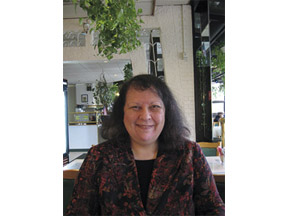“FatLand,” a new novel that wraps its story around a fictitious U.S. territory of the same name, calls attention not only to the bias that is sometimes placed upon overweight people, but to the ways in which a utopia for such people would be impossible.
North Bergen author Frannie Zellman’s first published novel deals with the complexities of society and how her characters – of various sizes – deal with them.
The novel begins about 34 years after FatLand, a territory in Colorado, is created. It stands for “Fat Acceptance Territory Lease Accession No Date.” The residents of FatLand can be as big and happy as they want, while outside the borders, health laws have made weigh-ins and food rationing the law.
Zellman said that in her novel, the U.S. is in a crisis, and an “anti-health law revolution” begins. Her cast of characters includes large belly dancers and a “dastardly” gym owner who is trying to steal money from FatLand’s government.
There’s murder, border crossing, and even a rescue.
Striving for perfection?
“There’s part of me that doesn’t like perfection in any type of utopia,” said Zellman.
Her novel was made possible after she taught writing workshops at the National Association to Advance Fat Acceptance convention in 2006. From that workshop, the Nashville-based publishing company Pearl Song reached out to her. She edited a poetry book through them, and it will be available on Amazon.com in the near future.
Pearl Song also published “FatLand,” which is now available on Amazon.com and is intended to be the first book in a trilogy.
Influenced by current events
Zellman said that she is frightened by what has been happening in England.
Zellman said, “They’re telling people that they can’t have a child if they’re over a certain weight, that they can’t adopt children if they are over a certain weight. They’re talking about doing almost exactly what I’m talking about [in my novel], having people weighed and charting the areas of the country where people are more overweight. This is very scary. It’s basically taking away most of their liberties.”
“If you place people in a land [where] they’re not discriminated against, they’ll do just fine.” – Frannie Zellman
________
She wanted FatLand to show how “fat” people are just like anyone else, and that they have the same joys and sadness in life as anyone else.
“If you place people in a land [where] they’re not discriminated against, they’ll go about the business of living just like anybody else, and they’ll do just fine,” said Zellman.
Born into activism
When she was growing up in New York state, her parents and grandparents influenced Zellman through their involvement in social activism. She explained that her grandparents were involved with labor rights and socialism in different forms. Her grandfather was a newspaper reporter who ended up working for the New York Post, “before it was Murdoch.”
“Two things were around me,” said Zellman, “social rights, and also writing of some kind or other, not fiction writing, but journalism. You know what’s interesting, how things make their way through generations.”
While her book hasn’t been on the market long, Zellman said that she hopes she is advancing awareness as well. One of her coworkers read her novel and said she found it “compelling.”
Became a professor
Zellman said that her constant travelling has defined who she is. She was born in upstate New York, moved to New York City, Long Island, and Queens before relocating to Cherry Hill, N.J.
She received her undergraduate degree in English at Brandeis University and her master’s in creative writing at Boston University in 1976 and 1980, respectively.
She was a professor at Temple University and Wisconsin University at Madison, before teaching in Malaysia. She then moved back to the Philadelphia area before moving to North Bergen and becoming an archivist at the Institute for Jewish Research in New York City.
She met her Pakistani husband, Shehzad, while travelling. She explained that Shehzad grew up among oppression as a Christian in a country that violently opposed his religion.
“He supports [my book] pretty strongly, which is nice,” said Zellman.
Started with poetry
Zellman received her creative writing degree in poetry. She said that her writing took shape when she started thinking about “crafting images that would be positive about fat people.”
While she had been published in other small publications before, Zellman said that the literary magazine “Radiance” was one of the first outlets that encouraged her to write.
“I read the magazine for a year before I got the courage and I finally said I’m going to do this,” said Zellman. “I sent them three poems [and] they said ‘we love your poems’ and they published all of them.”
Since then, Zellman said that she has found her creative zone. While there are other projects that she is working on, she says she hasn’t lost sight of “fat acceptance.”
